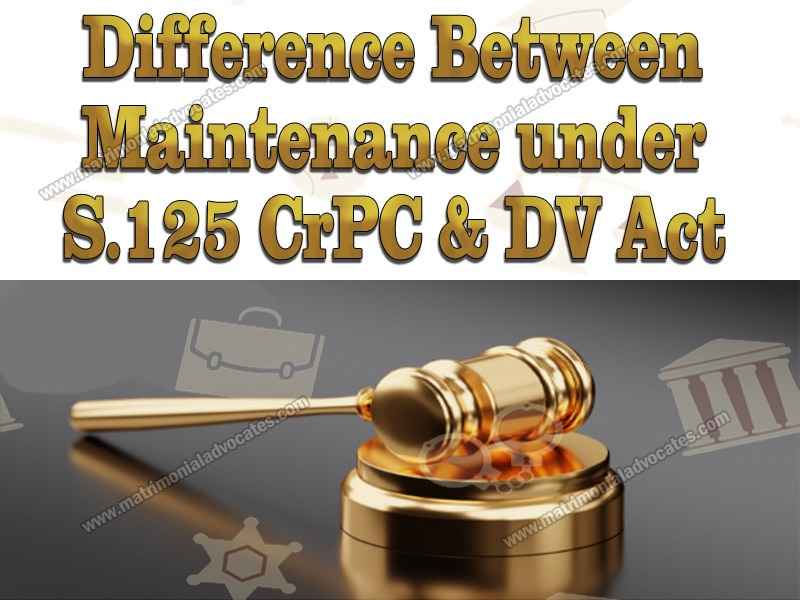INTRODUCTION
Welcome to the official blog of the Law Offices of Kr. Vivek Tanwar Advocate and Associates, where we are dedicated to providing litigation support services for matters related to crime against women. In today’s blog post, we aim to shed light on the prevailing issues surrounding crimes against women, the legal framework in place for their protection, and the steps we can take as a society to combat these heinous acts. Join us as we explore this critical subject and empower you with the knowledge to protect your rights and safety.
COMMON AND THE DIFFERENCES BETWEEN SECTION 20 DV ACT AND SECTION 125 CR.PC
The DV Act recognizes domestic violence as a distinct offence and provides protection and relief to victims, particularly women. It focuses on the civil aspects of domestic violence, such as obtaining protection orders, residence orders, monetary relief, and custody orders for children. Section 20 of the Domestic Violence Act (DV Act) and Section 125 of the Code of Criminal Procedure (CrPC) both address the issue of maintenance or financial support for women who are victims of domestic violence.
The key differences between Section 20 of the Domestic Violence Act (DV Act) 2005 and Section 125 of the Code of Criminal Procedure (CrPC):
- Purpose: Section 20 of the DV Act aims to provide monetary relief to the aggrieved person specifically in cases of domestic violence. It addresses the financial needs arising from such violence.
- Applicability: Section 20 of the DV Act is applicable to cases of domestic violence only, while Section 125 of the CrPC applies to a broader range of situations, including maintenance for dependents in general.
- Focus: Section 20 of the DV Act focuses on the specific circumstances of domestic violence and the financial assistance needed by the victim to cope with the consequences of such violence.
- Relief: Section 20 of the DV Act allows the Magistrate to pass orders directing the respondent to provide maintenance, medical expenses, and compensation to the aggrieved person. Section 125 of the CrPC provides for the payment of monthly maintenance to dependents, including wives, children, and parents who are unable to maintain themselves.
- Scope: Section 20 of the DV Act provides a more targeted approach to address the financial needs of victims of domestic violence, whereas Section 125 of the CrPC addresses maintenance requirements for a wider range of dependents in different circumstances.
CAN SECTION 20 OF THE DOMESTIC VIOLENCE ACT OVERLAPS SECTION 125 CRPC
Yes, Section 20 of the Domestic Violence Act (DV Act) can overlap with Section 125 of the Code of Criminal Procedure (CrPC) in certain cases, particularly when it comes to the provision of maintenance or financial support for women who are victims of domestic violence. While there is an overlap in their objective of providing financial assistance, there are certain differences in their scope and application. Here’s an overview of the overlap between these provisions with relevant cases:
- Section 20 of the DV Act: Section 20 of the DV Act deals with the right to maintenance for the aggrieved person. It empowers the Magistrate to pass orders directing the respondent (person responsible for the domestic violence) to provide monetary relief to the aggrieved person, including monthly maintenance, medical expenses, and compensation for losses suffered due to domestic violence.
- Section 125 of the CrPC: Section 125 of the CrPC deals with the provision of maintenance to wives, children, and parents. It allows a wife, who is unable to maintain herself, to claim maintenance from her husband. Similarly, it enables children and parents to claim maintenance from their respective relatives.
Overlap and Harmonious Construction: While there is an overlap between Section 20 of the DV Act and Section 125 of the CrPC regarding the provision of maintenance, it is important to note that both provisions operate independently. They can be availed simultaneously, and the aggrieved person can choose the most suitable option based on their circumstances.
LANDMARK CASES
Case: Hiral P. Harsora v. Kusum Narottamdas Harsora (2016) In this case, the Supreme Court held that Section 20 of the DV Act provides an additional remedy for maintenance apart from Section 125 of the CrPC. The court clarified that an aggrieved person can simultaneously claim maintenance under both provisions, and the Magistrate has the discretion to decide the quantum of maintenance based on the facts and circumstances of the case.
Case: Savitaben Somabhai Bhatiya v. State of Gujarat (2005) In this case, the Supreme Court observed that the provisions of Section 125 CrPC are applicable irrespective of the personal laws governing the parties. The court held that the right to maintenance under Section 125 CrPC is a secular provision that can be availed by any person in need, regardless of their religion.
CONCLUSION
Courts have emphasized the need for a harmonious construction of the provisions to ensure that the aggrieved person’s right to maintenance is adequately protected. The Magistrate has the discretion to consider various factors such as income, financial capacity, and the needs of the aggrieved person while deciding on the maintenance amount.
We are a law firm in the name and style of Law Offices of Kr. Vivek Tanwar Advocate and Associates at Gurugram and Rewari. We are providing litigation support services for matters related to Consumer laws. We have a website on which we publish blogs informing the litigants about the said laws. Draft a blog which can be published on our website…..
Written by: Adv. Priyanka Goel (D/945/2020).


They have a fantastic range of supplements.
cost of cheap lisinopril pill
Actual trends of drug.
The staff always ensures confidentiality and privacy.
can you buy lisinopril without prescription
Their staff is always eager to help and assist.
A reliable pharmacy in times of emergencies.
cost of generic lisinopril
Generic Name.
The best place for health consultations.
gabapentin ohne rezept
They maintain a high standard of hygiene and cleanliness.